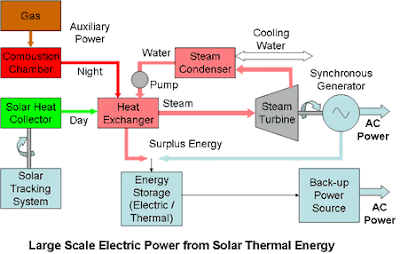lunes, 25 de febrero de 2013
Solar Thermal Energy.
Solar thermal energy is a form of energy in which the sun is used to produce heat that can be used in a variety of ways. People have been using it for thousands of years for a variety of tasks, and modern technology has considerably expanded the applications for the sun's heat. This should not be confused with solar power, in which the sun's light is used to produce electrical energy.
domingo, 24 de febrero de 2013
jueves, 21 de febrero de 2013
Thermal power plants in Spain and in the world.
Spain is one of the European
countries with more solar thermal energy power plants production and one of the
best ones in all the world.
Most places over the world are
also: USA, Algeria, Germany, China, Egypt, Mexico, Morocco, Australia, Italy,
Iran, France, and Spain.
And in Spain the most
provinces with thermal plants productions are: Badajoz, Ciudad real, Murcia,
Seville.
 |
| Seville (Spain). |
 |
| Morroco. |
Pros and cons of solar thermal energy
Pros:
Renewable
Unlike energy generated from fossil fuels, solar
energy is infinitely renewable. This makes the technology more reliable .The
use of solar energy can make countries more energy-independent by reducing the
energy they have to import.
Non-Polluting
Save for the pollution expended in the
manufacturing of the solar thermal energy device itself, solar thermal energy
produces almost no pollutants, such as toxic chemicals or greenhouse gases.
solar thermal energy provides a safe alternative to traditional energy sources,
most of which emit heavy carbon loads. solar thermal power produces no carbon
emissions.
Low Maintenance
After its initial installation, solar thermal
energy is generally low maintenance. Unlike devices that produce energy from
coal or natural gas, users can leave solar thermal energy devices alone for
long periods after installation. It takes smaller work crews to run solar
thermal arrays than more complex electricity generating facilities. Many solar
thermal devices, especially those that heat hot water, involve simpler
technology than photovoltaic panels.
Cons:
Expensive
As of 2010, it is more expensive to producing
solar energy than power from traditional fossil fuels, such as coal and natural
gas. Generally, steam produced from the burning of coal, is cheaper than steam
produced from solar thermal energy. The start-up costs of solar thermal energy
devices are usually higher because of the greater expense per unit of energy
generated. However, because solar thermal energy lacks a feedstock, in some
situations it may be cheaper over time.
Inconsistent
Devices cannot generate solar thermal energy
with the consistency of most fossil fuels, and cannot usually produce solar
energy on cloudy days, or after dark. This makes it an unreliable source of
energy and contributes to its expense, as those relying on solar energy must
have back-up power sources.
Storage
Unlike fossil fuels, we cannot easily store
either sunlight or hot water. This contributes to its unreliability, as users
are unable to produce large amounts of energy for later consumption or for
emergencies. While electricity generated by turbines can be stored in
batteries, the storage is costly and inefficient. Hot water cannot be stored
for long periods without a large loss of heat.
martes, 19 de febrero de 2013
How is Solar Thermal Energy used for electricity production?
Modern Solar thermal energy can be a economical way of generating clean electrical energy on a large scale. Solar thermal energy is the use of solar heat energy striking mirrors which focus the heat on to pipes carrying water. Steam is created which can be used directly or feed into turbines to generate electricity. The largest system to date is 9 solar thermal plants in California's Mojave Desert that generate at total of 354 MW of electricity.
 |
| A typical solar thermal energy installation |
Other uses of Solar Thermal Energy
- Domestic hot water: The simplest application of solar thermal in your house is to heat water for showers, washing, etc.
- Supplemental heating: Solar thermal can also be used to supplement your heating in the winter
- Pool heating: Swimming pools use a lot of energy to mantein the desired temperature.
Suscribirse a:
Comentarios (Atom)
